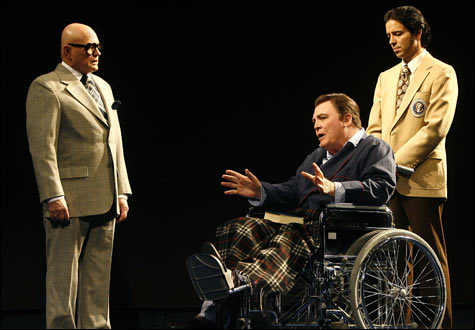
IT’S A PRETTY GOOD PLAY: But apart from Stacy Keach, this cast is unmemorable. |
The arrival of the touring company of Peter Morgan's Frost/Nixon while the movie version is still in theaters provides an unusual opportunity for audiences to see how a pretty good play made the transition into a superb movie. The show has lost some of its gloss, and the cast surrounding Stacy Keach as Richard Nixon — whose 1977 TV interviews with David Frost are its centerpiece — is unmemorable. But in essence it's the same play, staged by Michael Grandage, that made the journey from London's West End to Broadway.
The stage version (at the Colonial Theatre through February 8) is engaging, with a riveting final third that covers the point at which Nixon, who has thus far succeeded in transforming the interviews into an open-ended opportunity for self-promotion and sentimentality, begins to show cracks in his supremely controlled façade. Morgan is a skillful and sharp-witted writer with a great subject in hand. He knows how to tighten the screws as his two protagonists — the English talk-show host who's risked his career on a venture he's widely considered too soft (in the news sense) to put over and the disgraced ex-president who knows the country wants to see him own up to his guilt in the Watergate scandal — head for the final showdown. (It was wise of Morgan to skip the intermission.)
The problem is structural. The play is framed with a narration by Jim Reston, the professor and political analyst who's obsessed with Nixon — he's working on his fourth book about the president's corruption of his power — and joins Frost's team out of a desire to see him strong-armed on camera into delivering the confession that Gerald Ford's pardon released him from having to make in a court of law. Reston isn't the only character who addresses the audience; Jack Brennan, Nixon's chief of staff, who coaches him through the interview process, does too. But Brennan's far less frequent monologues feel tossed in. Reston is set up to be the voice of the play, and he's not an interesting enough voice; he thins it out. Reconstructing the material for the movie, Morgan, with director Ron Howard's help, built up all the supporting characters (among them Frost's friend and producer John Birt and reporter Bob Zelnick, who brings Reston on board) and made them equal partners in the narrative, so that the story doesn't appear to hang on Reston as the representative of betrayed liberal America cheated of its day in court and seeking restitution.
The play is partly about the ambiguous power of television, but Grandage's decision to place a large screen upstage that duplicates the image of the two men doesn't add any drama; it isn't until the very end of the final interview that the video image conveys any special meaning. Mostly it's a distraction; when Keach's Nixon is fielding questions from Alan Cox's Frost, he's so compelling that you just stop watching the screen. It's unfortunate for Keach that he's competing with Frank Langella's cinematic Nixon, because the match is unfair: Langella gives one of the greatest performances of his career as Nixon (just as he did on stage), and Keach doesn't have his depth or his emotional range. He can't make his moments of anger resonate; you don't see how much he's tamping down. On his own terms, though, he's quite fine — magnetic and very funny and surprisingly elegant. Keach really is a creature of the stage; he's never made the same kind of impression in movies or TV.